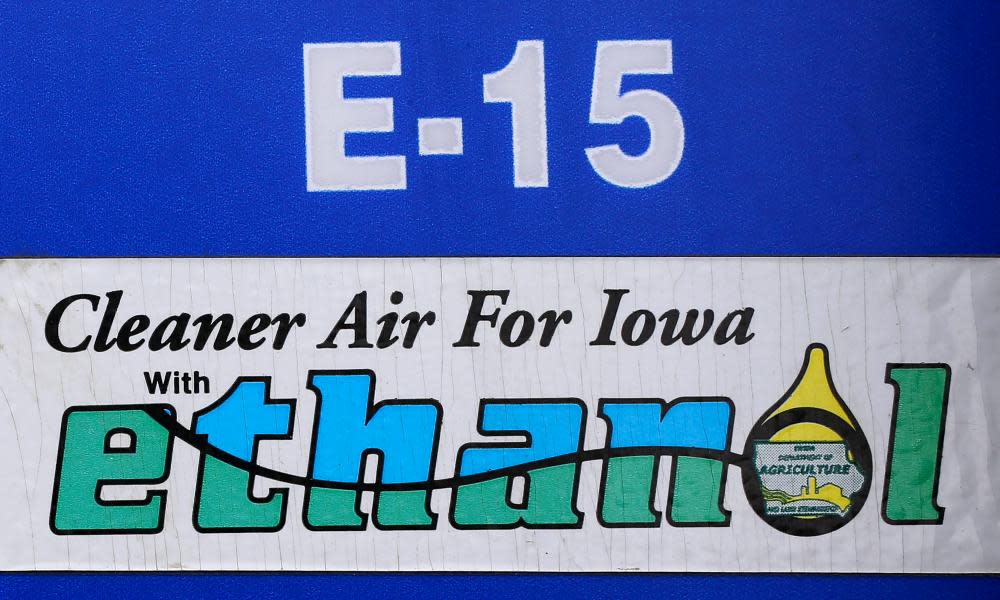Iowa operatives say ethanol worship is now as corny as The West Wing

For decades, supporting ethanol was considered the price of admission for the Iowa caucuses. Government backing for production of the corn-based biofuel was seen as a sacred cow. Presidential candidates who opposed it either skipped the state or changed their mind. There was even an episode of The West Wing that revolved around candidates grudgingly endorsing ethanol in order to save their political bacon.
Then, in 2016, Ted Cruz won Iowa despite being an ethanol opponent.
A coterie of top Iowa Republicans, including popular governor Terry Branstad, denounced the Texas senator. It didn’t matter.
Chris Wilson, Cruz’s pollster, said: “We tested it, we found that it was an issue, not a deciding issue [and] plenty of issues … were of equal importance.”
In other words, in an archconservative electorate, issues like abortion, cutting taxes and national security also played key roles.
In 2020, Republicans are not expected to have a competitive presidential primary. But as many as two-dozen Democrats may seek their party’s nomination. In Iowa, they will find their voters are far more suburban and urban than they have been in the past.
Large agricultural interests have made their support of the Republican party abundantly clear
Grant Woodard
Tim Gannon, the Democratic nominee for Iowa secretary of agriculture in 2018, told the Guardian the idea of ethanol as a dealbreaker in the state was “very much a stereotypical thing because of The West Wing and the big issue with Ted Cruz four years ago”.
But he added: “I think it’s still important because when you’re looking at the farm economy, partially because of tariffs and the trade situation and also because of biofuels policy coming out of Trump’s EPA [Environmental Protection Agency], we’ve seen things that aren’t good for prices.”
The Trump administration has issued waivers that allow oil refiners to avoid adding ethanol to their gasoline. It has also hesitated to implement year-round sales of E15, a gasoline that is 15% ethanol.
Nonetheless, a number of Iowa Democratic operatives were skeptical about how central ethanol would be in the caucus next year. Grant Woodard, a lawyer and former congressional chief of staff, scoffed: “Nobody cares.”
He added: “I think that as large agricultural interests in the state and nationally have made their support of the Republican party abundantly clear over the past two decades, I feel like there are few left in the [Democratic] party willing to make it a crucial issue.”
Speaking anonymously, an operative with ties to a presidential campaign noted that while the issue would still be “an effective hit” in a general election, it may be less meaningful in a primary. The operative also noted that ethanol has taken a back seat to trade as the No 1 issue for those whose livelihoods are tied to agriculture, because of Trump’s policies.
Another veteran operative, Pete D’Alessandro, said “I just don’t see a lot of people asking about it now” but added: “The great thing about the caucuses is that maybe someone will get organized to ask the question.”

D’Alessandro, who led Bernie Sanders’ campaign in the state in 2016, said he didn’t remember “an ethanol question at all” being raised that year. He also noted that he wasn’t asked about it during his own, unsuccessful 2018 bid for a Democratic nomination for Congress.
“I don’t think it’s one of the issues where Iowans are living and dying over it,” he said.
Polling indicates that Democratic caucus-goers do care about ethanol production. In a December poll from Focus on Rural America, 79% of respondents said they “would be more likely to support a candidate for president who backs increasing access to ethanol, to further reduce dependence on fossil fuels, such as crude oil”. Sixty-eight percent said they “would be more likely to support a candidate who vows to end the practice of giving waivers to oil companies to avoid meeting ethanol standards”.
A source with ties to the ethanol industry, given anonymity to speak frankly, said a large Democratic field might change the dynamic, “given the fact that we have this incredibly large field of candidates that are going to have to distinguish themselves and to have part of their strategy be meaningful outreach in rural America.
“I would think that a number of them would find that useful, and other policies meaningful to rural America, not only in a crowded field but in a general election.”
“People are [not] necessarily going to be driven 100% by this issue”, the source added, “but in a field this big with so many candidates to pick and choose and from” it could play a role if meaningful differences develop between candidates.
D’Alessandro agreed, saying ethanol policy “could be a tiebreaker”.

 Yahoo News
Yahoo News 
